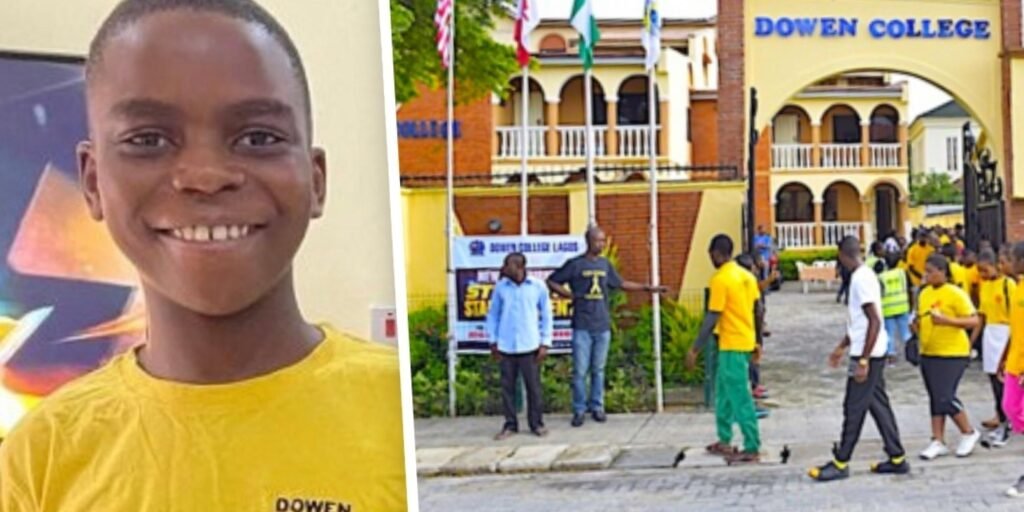Story
In December 2021, the tragic death of Sylvester Oromoni, a 12-year-old student at the prestigious Dowen College in Lekki, Lagos, gripped the nation and sparked a fierce debate over school safety and accountability. Sylvester’s demise, under circumstances shrouded in controversy and allegations of severe bullying, led to widespread calls for justice and institutional reform. As the legal proceedings unfolded, Magistrate Mikhail Kadiri, tasked with investigating the incident, delivered a ruling that has since been met with significant scrutiny and dissent, particularly from prominent human rights lawyer Femi Falana. Falana’s criticism focuses on what he perceives as a failure of the judicial process to adequately consider key evidence and testimonies, thereby raising fundamental questions about the integrity of institutional responses to child safety and the protection of the vulnerable in educational settings.
Source: The Vanguard Newspaper
Senses (Child Safeguarding and Protection Principles)
- Incident Background:
- Sylvester Oromoni, a 12-year-old student at Dowen College in Lekki, Lagos, tragically died under controversial circumstances.
- Coroner’s Ruling:
- Magistrate Mikhail Kadiri conducted the investigation into Sylvester Oromoni’s death.
- In his ruling, the coroner exonerated Dowen College from any wrongdoing.
- The ruling attributed Sylvester’s death to natural causes, specifically citing sepsis as the cause, which might have been exacerbated by the actions of the family doctor and not due to bullying or assault.
- Evidence and Testimonies:
- A government pathologist highlighted that a “black substance” was found in Sylvester’s stomach but was not tested toxicologically.
- The school doctor and nurses were reported to have massaged Sylvester’s leg for two days before advising his parents to take him home.
- Reactions and Criticisms of the Ruling:
- Human rights lawyer Femi Falana criticized the coroner for ignoring significant evidence, such as the untested “black substance” and the testimonies about bullying.
- Falana found it peculiar that the Acting Director of Public Prosecution (DPP) of Lagos State reversed her earlier recommendation to prosecute some staff and students without new evidence, just days after her initial recommendation.
- Judicial Decisions and Observations:
- The coroner ruled that the Acting DPP has the authority to withdraw her recommendations at any time.
- Despite testimonies of bullying, including direct observations of Sylvester being beaten and tortured, the coroner dismissed these accounts, stating Sylvester died from natural causes and downplayed the bullying elements.
- Final Observations and Legal Implications:
- The coroner argued that the negligence on part of the family doctor significantly contributed to Sylvester’s death, suggesting it was avoidable.
- Despite clear testimonies about bullying, the coroner concluded that the students named in the incident were not involved in Sylvester’s death.
- There was no referral of the family doctor to the Medical and Dental Council of Nigeria for potential sanctions, despite the ruling pointing to medical negligence.
Stones (Child Safeguarding and Protection Lessons for Parents, Government, and Society)
The tragic death of Sylvester Oromoni and the subsequent ruling by Magistrate Mikhail Kadiri have underscored significant challenges and gaps within the framework of school accountability and the judicial process in handling cases involving children. The controversy surrounding the coroner’s decision not only highlights the need for a more transparent and comprehensive approach to investigating such sensitive incidents but also calls for a systemic review of how educational institutions are monitored and regulated regarding student safety.
To move forward constructively, several steps should be considered:
- Enhanced Investigative Procedures: It is imperative to establish clearer, more stringent protocols for forensic and medical examinations in cases of student deaths under suspicious circumstances. The untested “black substance” found in Sylvester’s stomach should prompt a review of how evidence is handled and analyzed in future cases.
- Bullying Prevention and Response: This case has revealed the critical need for schools to implement robust anti-bullying policies that are strictly enforced. Training for staff and students on recognizing, reporting, and handling bullying incidents should be mandatory.
- Legal and Regulatory Reforms: The ability of the DPP to reverse decisions without new evidence, as noted by Femi Falana, suggests a need for more stringent checks and balances within the legal system. Legal reforms could include provisions that ensure all decisions to drop charges or alter recommendations are well substantiated and made transparent.
- Accountability in Healthcare: The involvement of the family doctor and the subsequent handling of Sylvester’s medical situation highlight the need for stringent oversight in school health management. Guidelines should be enforced on when and how external medical intervention is sought, particularly in emergencies.
- Public and Institutional Transparency: To rebuild trust in the system, there should be a push towards greater transparency in judicial and school administrative processes. Regular updates and open dialogues with the community could be part of this effort.
- Empowering Oversight Bodies: Strengthening bodies like the Medical and Dental Council of Nigeria to take swift and decisive action in cases of professional negligence could deter malpractice and increase professional accountability.
By addressing these areas, not only can justice be served in the tragic case of Sylvester Oromoni, but it can also pave the way for safer and more secure educational environments for all children. The goal moving forward should be to ensure that such tragedies are prevented through systemic change, rigorous enforcement of existing laws, and the introduction of new measures where gaps are identified.
Relevant Link(s): https://childreninfobank.com/safebank/sylvester-oromoni-its-curious-coroner-ignored-evidences-falana-faults-ruling/

